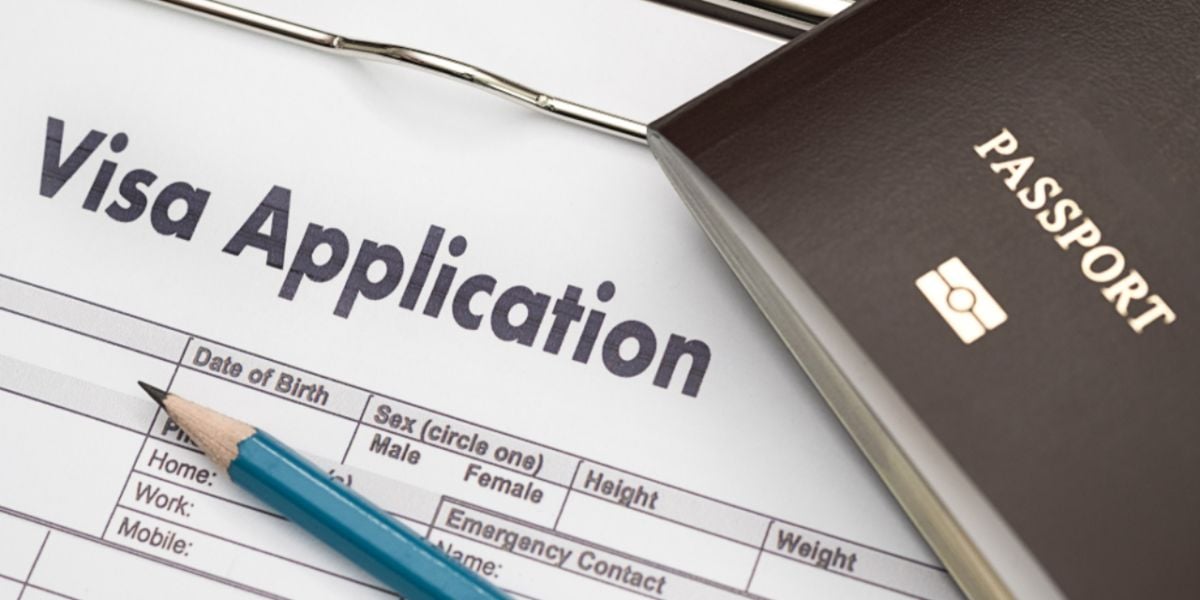
Obtaining a visa for Kuwait can be complex, with options ranging from short-term visits to long-term residencies, each tailored for work, study, or family reunification. This guide offers a concise overview of Kuwait's visa processes, including the "Iqama" system for residency visas and visa-on-arrival for citizens from 53 countries.

Types of visas for Kuwait
Long-term (or resident) visas in Kuwait are issued based on specific circumstances. The most common are work purposes, study purposes, or family reunification. These visas usually have a validity that ranges from 6 months up to 5 years. Residency visas in Kuwait are referred to as an “Iqama”, which is the Arabic word.
Short-term visas-on-arrival are available to citizens of 53 countries, including Andorra, Australia, Austria, Belgium, Bhutan, Brunei, Bulgaria, Cambodia, Canada, China, Croatia, Cyprus, Czech Republic, Denmark, Estonia, Finland, France, Georgia, Germany, Greece, Hong Kong, Hungary, Iceland, Ireland, Italy, Japan, Laos, Latvia, Liechtenstein, Lithuania, Luxembourg, Malaysia, Malta, Monaco, Netherlands, New Zealand, Norway, Poland, Portugal, Romania, San Marino, Serbia, Singapore, SLovakia, Slovenia, South Korea, Spain, Sweden, Switzerland, Turkey, Ukraine, United Kingdom, United States, Vatican.
If you are not a citizen of a country granted a visa-on-arrival, your spouse and family may have to remain in their home country until you have arrived and secured their visas for them. The visitor visa is a piece of paper, and you must keep it with your passport at all times. You must present your visa when exiting Kuwait.
Good to know:
You can also apply for a visitor visa on Kuwait's website and print it off. This will allow you to proceed directly to passport control upon arrival.
Attention:
You will be denied entry into Kuwait if your passport contains an Israeli stamp.
Obtaining a resident visa for Kuwait
A permanent residency (Iqama) in Kuwait can be obtained for the following reasons:
- Studying in Kuwait;
- Working in Kuwait;
- Family reunification.
Resident visas usually have a validity of between 6 months and 5 years, depending on the circumstances.
All residency visa applications are made at the Ministry of Social Affairs and Labor and are issued by the Immigration & Passport Department. However, there will be different requirements depending on your purpose for obtaining the residency.
Work purposes
If you're moving to Kuwait for work, you will need to get a work permit before you are able to enter the country and apply for a residency visa. Your employer should assist you with the requirements for processing your visa both prior to traveling to Kuwait and after you arrive. Depending on your contract and position, your company may issue a temporary work visa through your local Kuwait embassy before traveling to Kuwait. This visa will only be issued to the employee; any family members traveling with you will obtain a three-month visitor visa upon arrival, depending on their citizenship.
Once in Kuwait, your company will assist you in obtaining residency visas for yourself and your family members. Your employer will provide you with a comprehensive list of documents to bring with you to Kuwait for visa processing. Typically, you and your spouse (if applicable) will need to have your university degrees attested, copies of your home driver's license attested, an original background check, one set of certified fingerprints, and several passport photos.
Medical testing may also be required in addition to the completion of a full medical assessment in Kuwait. Although companies also recommend spouses have the same medical tests completed prior to arriving in Kuwait, this may not be necessary. If your spouse will be obtaining a family visa, they will have to complete medical testing in both Bahrain and Kuwait. Medical testing from your home country will not be used. Your employer will assist you with instructions on the completion of medical testing, both in Bahrain and Kuwait.
Your residence visa will replace your work visa once it is issued. Please note that there will be periods during the visa process during which you will not have your passport and will, therefore, be unable to leave the country. Once your residence visa has been issued, you may come and go into the country as often as you please.
Several documents that are required to apply for a work permit:
- Passport with a validity of at least 2 years from the date of arrival in Kuwait;
- Valid employment offer;
- Completed visa application issued by the Kuwait Ministry of Foreign Affairs;
- A passport-size photo;
- HIV test (AIDS test) results copy;
- A health certificate from a local doctor showing that the applicant is in good health and does not have a contagious disease. (Tests which need to be made are for hepatitis B and C, syphilis, malaria, filariasis, and chest X-rays for tuberculosis).
- Police clearance showing no criminal record.
Once your employer has submitted these documents, you will receive a “No Objection Certificate” (NOC), which will allow you entry into Kuwait. Kuwait's Ministry of Foreign Affairs will send a copy of the work permit to the Kuwait embassy or consulate in your country of residence. Your employer will also usually send you a copy of the work permit to take to the embassy in person. Only after you've arrived in Kuwait can your employer apply for your residency visa.
Finally, once the residency visa has been issued, you will need to apply for a Kuwait Civil ID (national identification card). You will need to do this within 30 days of receiving your residency visa.
Students
International students choosing to move to Kuwait can obtain a residency visa, and the duration of this visa will depend on the length of your academic program.
To begin your residency visa process, you must first be accepted into one of Kuwait's universities. The school administration must accept and approve your visa application before it is submitted. The application form can be obtained online or from the Kuwaiti Embassy or Consulate in your country.
The requirements for obtaining a student residency visa in Kuwait are:
- Passport with a validity of at least 2 years from the date of arrival in Kuwait;
- Completed visa application issued by the Kuwait Ministry of Foreign Affairs;
- A passport-size photo;
- HIV test (AIDS test) results copy;
- A health certificate from a local doctor showing that the applicant is in good health and does not have a contagious disease. (Tests that need to be made are for hepatitis B and C, syphilis, malaria, filariasis, and chest X-rays for tuberculosis);
- Police clearance showing no criminal record.
Important:
You will not be allowed to work in Kuwait if you are on a student residency visa.
Family reunification
In 2024, Kuwait has been working hard to facilitate the process for existing residents to bring their families into the country. Expats who are residents of Kuwait can now apply for a family residence visa on behalf of their spouse and children below the age of 18.
This visa is a renewable, multi-entry visa with a validity of up to 3 years.
There are a few eligibility requirements for the applicant in order to be able to do this:
- The applicant must hold a university-level degree that corresponds to their field of work in Kuwait.
- There are certain professions (including engineering, media, medicine, and higher education roles) that may not require a degree.
- The applicant must have a minimum salary of KD 800.
- The minimum salary may be waived in the case that both parents reside in Kuwait and are applying on behalf of a child aged 5 or under.
Important:
It is illegal to work in Kuwait with just a family residence visa. In order to work, family residence visa holders must obtain a separate work permit/residence permit.
General visa application process in Kuwait
While each type of long-term visa in Kuwait has its own differences when it comes to the application process, there are some general commonalities between them. Below is a detailed breakdown of everything you will need and the steps you will have to take:
Securing sponsorship
All long-term visas in Kuwait require a sponsor (or “Kafeel” in Arabic). If you are traveling to Kuwait for work, your employer will act as your sponsor. For students, the school will act as a sponsor. Finally for families, the family member who is already a resident in Kuwait will be considered the sponsor. The sponsor is the one who initiates the application process by obtaining a no-objection certificate (NOC) from the relevant Kuwaiti authorities.
Medical exams
All long-term visa applicants must undergo a medical examination to ensure they are free from infectious diseases and other health conditions that could pose a public health risk. This examination is typically conducted in your home country at approved medical centers. Results are submitted as part of the visa application. Tests are conducted for hepatitis B and C, syphilis, malaria, filariasis, and chest X-rays for tuberculosis. Applicants may be refused a visa if they are deemed unfit.
Security clearance
Another important step in the visa application process is obtaining a police clearance certificate from your home country, confirming that you have no criminal record. This certificate ensures that the individual poses no security threat to Kuwait. Applicants who are seen to be a potential threat to the country may be refused a visa.
Document submission
Once all the above mentioned processes have been completed, you must then submit all required documents as specified per visa type to the Kuwaiti embassy or consulate in your home country.
Entry visa issuance
Upon approval, the Kuwaiti embassy or consulate will issue an entry visa, allowing the applicant to travel to Kuwait. Once you have arrived in Kuwait, there will be additional procedures that need to be carried out, including another medical examination, fingerprinting, and obtaining a civil ID card, which will serve as your official identification during your stay in Kuwait.
Visa expiry fines in Kuwait
It is extremely important to ensure that your residency visa is renewed as quickly as possible to avoid facing fines and charges. Kuwait's new residency law can have people facing 1 year in prison along with a fine of up to 2,000 KWD for overstaying their residence without renewal.
Kuwait usually gives generous grace periods to avoid having to implement these charges and fines, but proper care should be taken to ensure that your residency visa is renewed on time.
Future prospects for visas in Kuwait
Kuwait's Ministry of Interior has recently announced the consideration of launching residency visas for investors. All foreign investors, regardless of their nationalities, will initially be given a 6-month multiple-entry visa to legally establish their investments in the country. Once this is done, they will be eligible for a 5-year renewable visa. It has also been stated that those with an investor visa will not need to be physically residing in Kuwait. Holders of investor visas will also be able to sponsor their spouses and other dependents.
This visa is intended to put an end to the sponsor system, which is widely seen across Gulf countries, and allow individuals to obtain residency visas without the need for a sponsor.
The official launch of Kuwait's investor visa is yet to be announced, but is a highly anticipated advancement.
Further prospects include raising the maximum residency period for expats working in the country to 5 years (currently, they are granted just 1 year).
There have also been conversations surrounding those who own real estate properties in Kuwait and the potential to offer them 10-year visas.
Finally, children of Kuwaiti mothers but non-Kuwaiti fathers could also be eligible for a 10-year visa under the new changes proposed.
Although long-term visas to Kuwait seem to be a little difficult to obtain as the current process stands, a lot of changes are starting to be made in order to facilitate this process. These changes come as a significant shift in the country's political landscape.
Useful links:
We do our best to provide accurate and up to date information. However, if you have noticed any inaccuracies in this article, please let us know in the comments section below.








